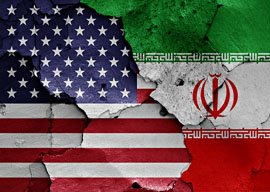
February 03, 2017

Source: Bigstock
When Gen. Michael Flynn marched into the White House Briefing Room to declare that “we are officially putting Iran on notice,” he drew a red line for President Trump. In tweeting the threat, Trump agreed.
His credibility is now on the line.
And what triggered this virtual ultimatum?
Iran-backed Houthi rebels, said Flynn, attacked a Saudi warship and Tehran tested a missile, undermining “security, prosperity, and stability throughout the Middle East,” placing “American lives at risk.”
But how so?
The Saudis have been bombing the Houthi rebels and ravaging their country, Yemen, for two years. Are the Saudis entitled to immunity from retaliation in wars that they start?
Where is the evidence Iran had a role in the Red Sea attack on the Saudi ship? And why would President Trump make this war his war?
As for the Iranian missile test, a 2015 U.N. resolution “called upon” Iran not to test nuclear-capable missiles. It did not forbid Iran from testing conventional missiles, which Tehran insists this was.
Is the United States making new demands on Iran not written into the nuclear treaty or international law—to provoke a confrontation?
Did Flynn coordinate with our allies about this warning of possible military action against Iran? Is NATO obligated to join any action we might take?
Or are we going to carry out any retaliation alone, as our NATO allies observe, while the Israelis, Gulf Arabs, Saudis and the Beltway War Party, which wishes to be rid of Trump, cheer him on?
Bibi Netanyahu hailed Flynn’s statement, calling Iran’s missile test a flagrant violation of the U.N. resolution and declaring, “Iranian aggression must not go unanswered.” By whom, besides us?
The Saudi king spoke with Trump Sunday. Did he persuade the president to get America more engaged against Iran?
Senate Foreign Relations Committee Chairman Bob Corker is among those delighted with the White House warning:
“No longer will Iran be given a pass for its repeated ballistic missile violations, continued support of terrorism, human rights abuses and other hostile activities that threaten international peace and security.”
The problem with making a threat public—Iran is “on notice”—is that it makes it almost impossible for Iran, or Trump, to back away.
Tehran seems almost obliged to defy it, especially the demand that it cease testing conventional missiles for its own defense.
This U.S. threat will surely strengthen those Iranians opposed to the nuclear deal and who wish to see its architects, President Hassan Rouhani and Foreign Minister Mohammad Javad Zarif, thrown out in this year’s elections.
If Rex Tillerson is not to become a wartime secretary of state like Colin Powell or Dean Rusk, he is going to have to speak to the Iranians, not with defiant declarations, but in a diplomatic dialogue.